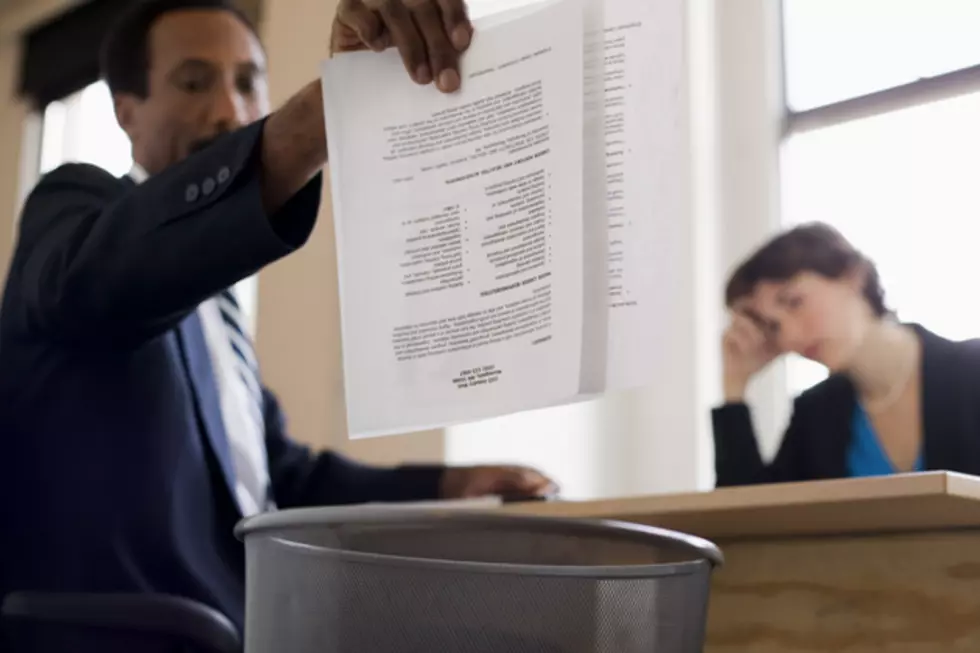
5 Common and Major Interview Mistakes
Job interviews are hard enough without sabotaging yourself by making some major mistakes that hiring managers say are all too common. These seem like obvious interview no-nos, but they’re at the top of every recruiter’s list of things they see people doing all the time that kill their chances of being offered a job.
If you’ve been going on interviews but haven’t been getting offers or calls back, it’s time to take a close look at your interview behavior and see if you’re making any of these five common, but huge mistakes:
Schedule Fail
The very first impression the interviewer has of you is whether or not you showed up on time. So, if you’re at all late for an interview, you’ve probably landed yourself at the bottom of the list of possible hires, no matter how much preparing you did. And don’t think that getting lost or dealing with traffic are reasonable excuses. Being late shows you didn’t leave enough time to get there.
Other scheduling-fail interview killers include checking the time and fidgeting like you have somewhere else to be. Also, keep in mind that if you don’t allow yourself time to be early to the interview, you’ll probably end up driving rude and you could be the guy who cuts off your interviewer and flips her the bird on your way in. Hiring managers assure us that that won’t go unnoticed.
Wardrobe Woes
It’s not likely you were the guy who once wore a Boy Scout uniform to a job interview with no explanation, but according to H.R. experts, inappropriate interview attire is a more common problem than you’d think. Even if a company has a casual environment, showing up in flip-flops and shorts (yes, that happens all the time) will only prove you don’t care enough about the job to put on socks and, you know, pants.
You have to be careful not to overdress, too, because then it will seem like you don’t know what job you’re interviewing for. But if you don't know how the interviewer might be dressed, always err on the side of more dressed up. Furthermore, keep in mind that dressing provocatively is never the way to get the job.
Cell Phone Faux Pas
Hiring managers say that people who do not turn off their cell phones during an interview aren’t likely to need their phones turned on afterwards, because they aren’t getting a call. Forgetting or failing to turn off your phone is rude, first of all, and shows you don’t pay attention to details. It’s also an indication of how you might treat clients.
Believe or not, a lot of interviewers say they’ve had candidates answer calls and exchange text messages during interviews. They weren’t hired.
Bad Mouth
More often than not, what was a good interview goes bad when your mouth gets you in trouble. Many of us regularly use colorful language, but letting something profane slip in an interview is almost always a ticket to still needing a job. Experts say it’s surprising how often interviewees will tell an off-color joke to break the ice, only to find themselves falling through the ice.
Other bad-mouth problems include talking about yourself too much in ways that have nothing to do with the job, bashing a former employer, giving a list of demands you require for accepting the job, talking about salary too soon and just rambling on off-topic when asked a question. Check your mouth before it wrecks you.
Not Even Ready
An unprepared interviewee is an interviewee who might as well not have shown up at all. It may seem unlikely, but people often show up for interviews having done no research whatsoever. You don’t want to be the candidate who asks, “What’s the name of the company?” Or, “What’s the job?”
A person who can’t answer questions about how their skills and experience apply to a job or help the company will be eliminated from the candidate pool. The person who has no intelligent questions for the interviewer will appear indifferent to the process. The amount of preparation you do for the interview is a strong indication of the amount of preparation you’ll do for the actual job.
You also need to be prepared after the interview. Not sending a thank-you note or any kind of follow-up is also a big reason people don’t get called back by hiring managers.
More From 1025 KISS FM








